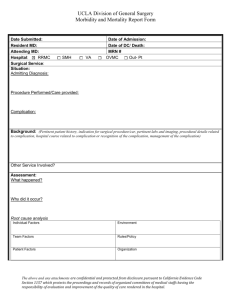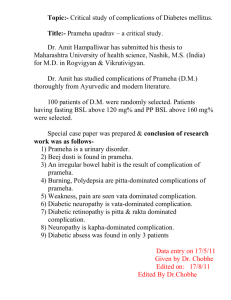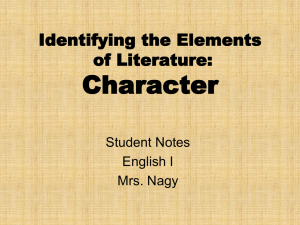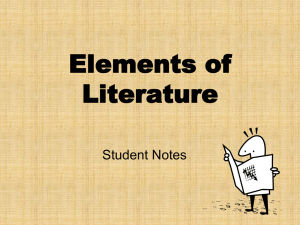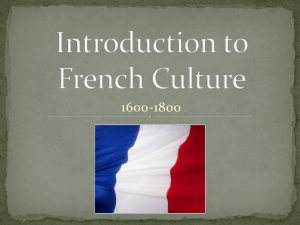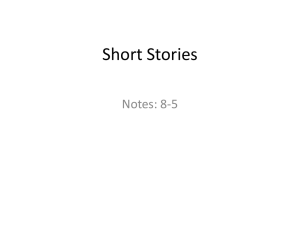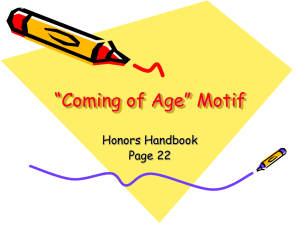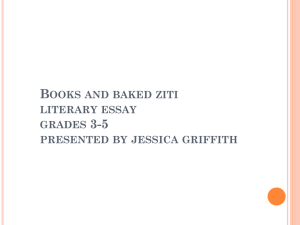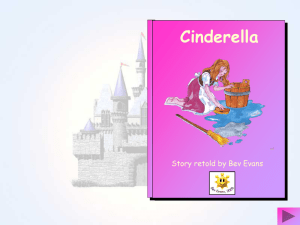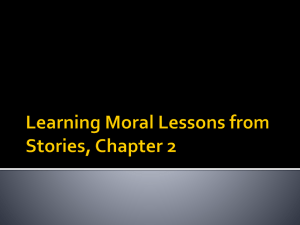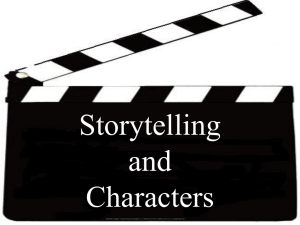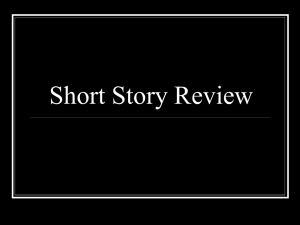Creative Writing--Fiction Day 1 (structure)
advertisement
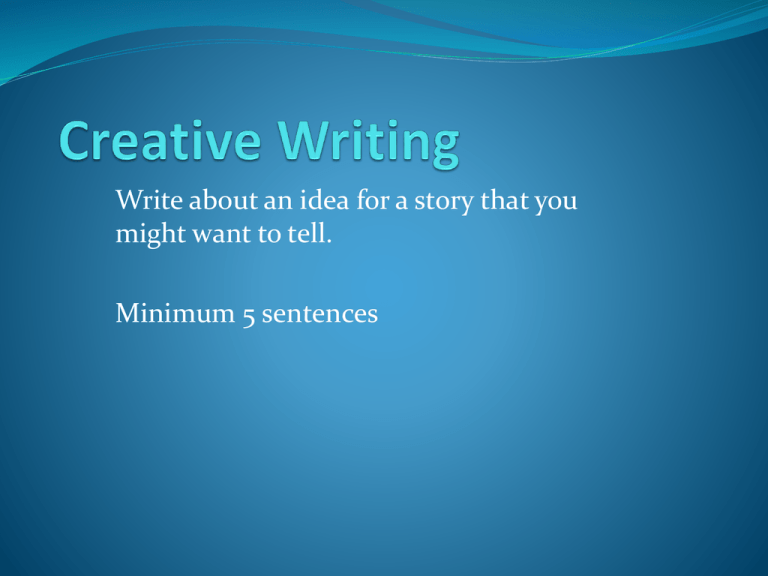
Write about an idea for a story that you might want to tell. Minimum 5 sentences Objective By the end of this lesson you should be able to identify the following ideas about fiction: Protagonist Antagonist Conflict Complications Shifts of power Crisis Falling action Resolution Draw a face that is missing a vital feature. Form A “story” is a “form” of literature. Like a face, it has necessary features in a necessary harmony. What a story must include: Conflict Crisis Resolution Conflict Only trouble is interesting Example: the picnic Conflict: discuss 3-D: Drama = desire + danger Desire = want Want leads to danger Desire Think about three possible desires that could drive a story. Danger Great dangers are not always the most spectacular Therefore, the greatest wants don’t have to be spectacular, they just need to spectacularly felt. Not shock dangers Write Write about the possible dangers, no matter how unspectacular, each desire could produce. What is the conflict of each story? Now that you’ve got the desire, describe the conflict of that this story could have. What is the want? Conflict Categories Wo/man against wo/man Wo/man against nature Wo/man against society Wo/man against machine Wo/man against God Wo/man against her/himself Where does your story fit? Into which category does your desire fit? Why? Crisis and Resolution Once conflict is established and developed in a story, the conflict must come to a crisis—the final turning point—and a resolution Why does a story need order? Order Order implies that the subject has been brought to closure Reader leaves with a sense of completion The Arc of the Story The decision points that lead to a final choice Change, change, change! Story as a War 1. Get your fighters fighting Start the conflict right away in order to get your reader’s attention. Story as a War 2. Have something—the stake—worth fighting over The stake over which wars are fought is usually a territory. It is vital to your story that the territory around which the conflict is centered is as important as your own home. Story as a War 3. Have the fight drive into a series of battles with the last battle in the series being the biggest and most dangerous of all. Each battle in the story is a complication that adds to the tension of the conflict Each battle should have more at stake and should be bigger than the last Each complication is a change in the story Story as a War 4. Have a walking away from the fight Permanent change Resolution Apply Look at the outline and the desire/want surrounding it. Describe how one of your potential stories fits into each of the four points of “The Story as a War” example. PART II: POWER Patterns of Power Protagonist: central character Antagonist: opponent Give me three example of each from the last three movies you have seen Power Each antagonist is given equal power so the reader is left in doubt about the outcome The antagonist must represent a real and potent danger The pattern of the story’s complications will be achieved by shifting the power back and forth from protagonist to antagonist, until the power shift irretrievably in one direction How to think about power Identify a source of power for each antagonist surrounding the character’s conflict If power is one sided, suspense will be lost Power is anything that prevents the protagonist from reaching what he/she desires Freitag’s pyramid of five actions Check Mark In a compact story form, the falling action and the expository are going to be almost nonexistent, so we need another form… Think of the story form not as a pyramid with sides of equal length but as an inverted check mark. Cinderella Conflict in Cinderella Cinderella’s mother dies and her father marries a brutal woman with two horrific daughters. Cinderella must do all the dirty jobs. Power Pattern Stepmother (starts out with more power) Ugliness Evil Numbers (daughters) Parental Authority Cinderella Beauty Goodness First Complication/Event The first event/battle of the story is that an invitation arrives from the Prince, which explicitly states that all ladies of the land are invited to the ball. Where does the power shift because of this event? Second Complication Stepmother takes back power by blunt force “YOU CAN’T GO!” Third Complication The Fairy Godmother appears. Very powerful to have magic on your side! Fourth Complication Magic only last until Midnight. Be home by twelve or risk exposure and defeat. Fifth Complication Prince falls in love with Cinderella. Love is even more powerful in Literature than magic Sixth Complication Clock strikes 12 Loses her slipper Seventh Complication Prince sends out a royal decree that everyone must try on the slipper. A dramatic repetition of the original invitation Cinderella given her rights again Eight Complication “YOU MAY NOT!” The stepmother also repeats her assumption of brute authority by hiding Cinderella away Delay by grotesque comedy: one sister cuts off her toe, the other cuts off a heel Crisis The slipper fits! Magic, love, and royalty join to recognize the heroine’s true self; evil, numbers, and authority are powerless against them. The power struggle has been decided. When the slipper fits, no further action can occur that will deprive Cinderella of her desire. The change that occurs is significant and permanent. Brief Falling Action Wedding Walking away from the fight Resolution And they live happily ever after. Read: “The Use of Force” By William Carlos Williams Answer Answer questions 1-3 at the end of your reading. Write your answers on the back of your starter. Question 2 Using question 2 as your guide, plot the story by points with an upside-down-checkmark story-form chart. Be sure you highlight: Protagonist Antagonist Conflict Complications Shifts of power and points Crisis Falling action Resolution
